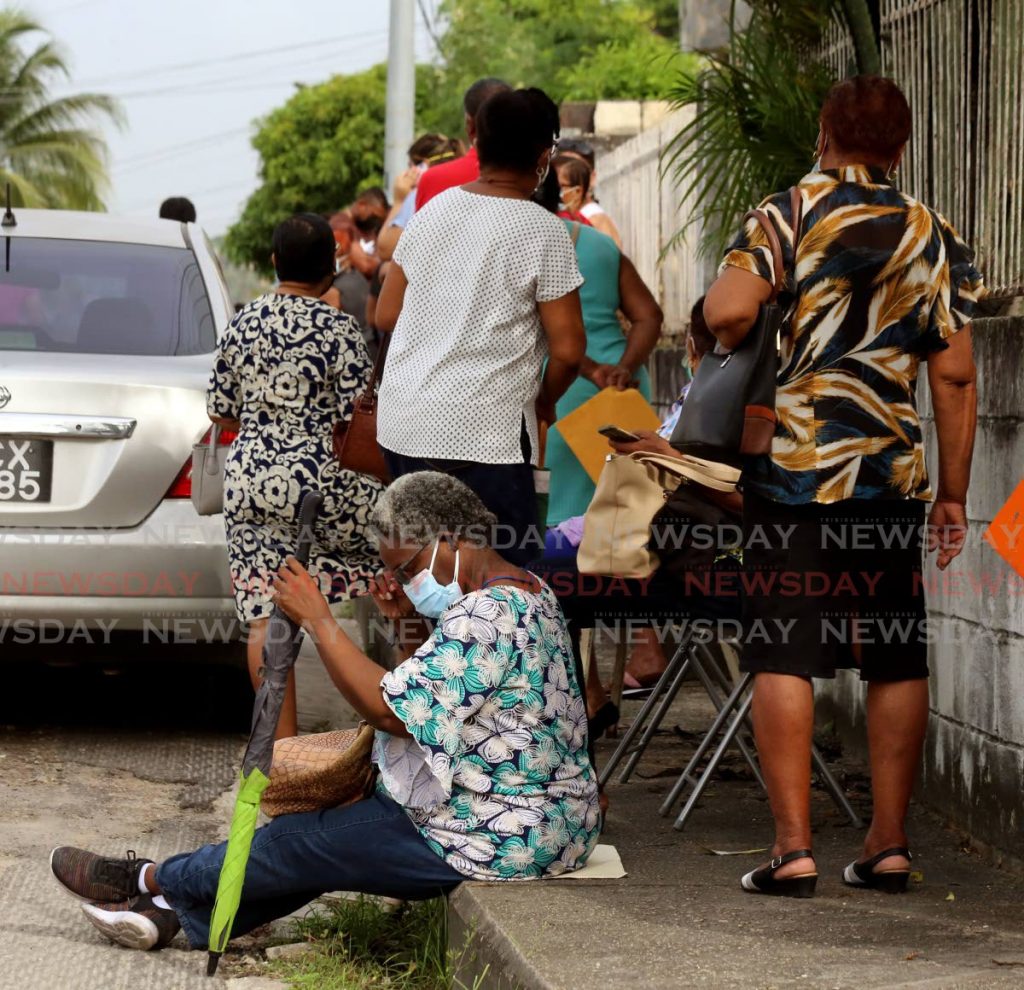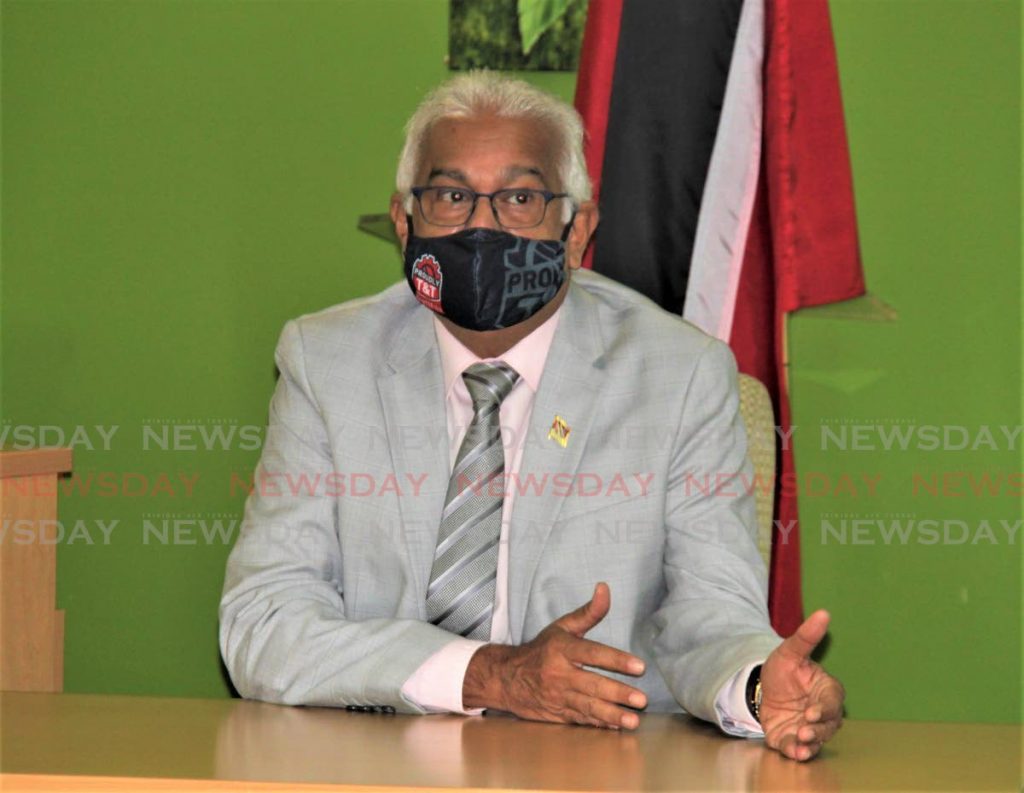Deyalsingh says sorry for chaotic Sinopharm crowds

WHILE the Health Ministry said it expected high vaccine acceptance as it began allowing walk-ins for covid19 vaccinations, it did not anticipate the chaos that took place on Wednesday morning.
Health centres throughout the country were jam-packed with people eager for their first jab with the Sinopharm vaccine.
As a result, a new alphabetical system will begin on Thursday and only those 60 and older or with a non-communicable disease may use it.
On Saturday, the ministry announced walk-in arrangements for the first dose of Sinopharm at 36 locations from Wednesday for people in those categories.
In its infographics, the ministry made it clear, "Only people who are eligible will be facilitated. "However, it seems some people did not realise the walk-in shots were not available to anyone who wanted them.
On Wednesday morning, videos and photos circulating on social media showing large crowds at all the vaccination sites, with little to no physical distancing. Police had to intervene at many of them to ensure public health regulations were being adhered to.

Health Minister Terrence Deyalsingh took the opportunity during the ministry's virtual media conference to apologise to the nation for what had happened.
He said, "We underestimated the demand for vaccines and we must sincerely apologise. And I, as minister, sincerely apologise for this this morning."
He said the appointment system was "not working in the best interest" of the elderly population, so the ministry sought to begin the first-come, first-served, walk-in method that many people had been asking for.
"But coming out of this apology, we must learn some lessons," he said. "From Thursday, we will start an alphabetical system using surnames in groups of five.
"So from tomorrow, over 60 alone.
"We are only going to be handling persons over 60 with surnames starting from A-E (who) will get into our health centres. On Friday, we going to do F-J and then we will communicate with the public (and)so on and so on."

He thanked the public for "their overwhelming response to the vaccination drive" as it showed there was a high level of vaccine acceptance.
He added that while he was in no way making excuses, many of the people who showed up at the vaccination sites on Wednesday were not eligible.
"And the CEOs (of the regional health authorities) could attest to this...and that was part of the issue, healthy persons under 60.
"But we must accept responsibility and in accepting responsibility, we do now have to cut it off to persons over 60, unfortunately....Persons under 60, (for) the time being, don't show up from tomorrow. Your turn will come as we get more and more vaccines into the country."
CEO of the North West Regional Health Authority Salisha Baksh said in efforts to manage the crowds the authority expected with the implementation of walk-ins, more security officers had been added at each site and the police agreed to patrol these places regularly.
She said, "We did not expect the numbers we have seen this morning."
'WE'LL PLAY IT BY EAR'
Asked by a reporter if the issue of common surnames may cause yet another issue of overcrowding, Deyalsingh said the ministry will "play it by ear."
He clarified the new, alphabetical arrangement is strictly for the administration of the first doses of the vaccine.
"We are going to look and learn as to how this plays out, because there are some surnames – let's take (for example) M for Mohammed. There's going to be a lot of them.
"So we'll play it by ear. But we are doing this in an effort to mitigate what happened today and bring a more ordered, predictable system."
Asked by Newsday if the ministry would consider drive-through vaccinations, which have been done in several other countries, Deyalsingh said it was being looked at for second doses.
"The chief medical officer (CMO) lays down the protocols for vaccines. So what you are noticing now, for the second dose, the CMO has advised that we no longer do that prior screening with blood pressure and so on...and the waiting time for (observation after taking the) AstraZeneca (vaccine) has reduced from 30 minutes to 20 minutes. So what you are seeing now is, the second dose will be a faster throughput of patients.
"So we are considering, based on the CMO's advice, how we will operate drive-throughs."
But he pointed out, "To do that, you will then need a lot of acreage when people have to wait in a car for 30 minutes and so on and how do you monitor them...But it's a possibility we are looking at."
On the vaccination rollout to elderly patients at long-stay homes, he said 750 of the 1,000 allocated doses of vaccines have already been used.
"Which is very good, because initially, the take up was low. But once we made the public appeal for the guardians or children of these persons to give consent, there was a rapid increase."
Epidemiologist Dr Avery Hinds said the ministry only knows of one person who took the first dose of a covid19 vaccine locally who subsequently died.
He said the patient took the vaccine "not too long before they actually became ill.
"And it was sort of in the timeframe where their immune response, even to the first dose of vaccine, wouldn't have had time to kick in."
He reminded the public, "It's always a possibility that even after you get vaccinated and you've been exposed in the timeframe where your immune response hasn't had the time to optimise itself, you could still become infected. And if you have other pre-exisiting conditions that could put you at risk, then you could still have an adverse outcome."
CURVE BEGINNING TO FLATTEN
Hinds said the occupancy of the parallel healthcare system is now down to 60 per cent, with Trinidad's occupancy at 65 per cent and Tobago's at 24 per cent.
He said the overall ward-level occupancy was at 57 per cent, while the Intensive Care Unit (ICU) is at 98 per cent and the High-Dependency Unit (HDU) at 96 per cent.
He said, "The epidemic curve, which has grown to quite some height in the month of May, we're seeing now that in the month of June, the first few days, the numbers that seem to be accumulating seem to be slightly less. They seem to be on the decline.
"At present, this is the trend we're seeing, and this trend is an encouraging one...We are hoping we continue to see that decrease as we move through the current week."
He said the number of samples that return positive of every 100 samples has now dropped to the mid-30s. He hopes this is another indicator of a "slowing and decrease of the level of viral circulation within the population."
As of 4 pm on Wedneday, there were 9,869 active cases of covid19 cases and a total of 17,048 recoveries and 616 deaths.
A total of 136,597 people had received their first dose of either the Sinopharm or AstraZeneca vaccine, and 5,896 are fully vaccinated.


Comments
"Deyalsingh says sorry for chaotic Sinopharm crowds"